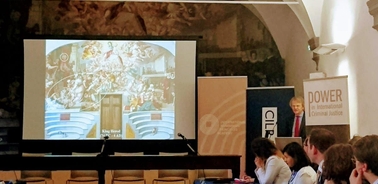- Home
- We Are Law School
- News
- Power In International Criminal Justice: Towards A Sociology Of International Justice
Power in International Criminal Justice: Towards a Sociology of International Justice

Marina Aksenova spoke at a conference on power in international criminal justice, which took place in Palazzo degli Innocenti in Florence on 28-29 October 2017 and was jointly organized by the Centre for International Law Research and Policy and the International Nuremberg Principles Academy. The purpose of the event was to start developing the subfield of study – sociology of international justice.
The field of international criminal law has been rapidly growing for the last two decades, starting with the creation of the ad hoc tribunals for the former Yugoslavia and Rwanda and culminating with coming into operation of the permanent International Criminal Court (ICC). With maturity came the realization of the limitations of the discipline: there is a clear dichotomy between heavy expectations vested in international criminal law and its failure to deliver on its declared objectives. Arguably, international criminal law is entering a new phase, which could be called ‘beyond great aspirations’. There is mounting criticism of international criminal justice, which, in some instances, results in practical steps manifesting discontent, such as the recent withdrawal of Burundi from the ICC. This means that international criminal law, as discipline, must be more realistic and self-aware of what it can achieve and how it can improve.
International criminal law is entering a new phase, which could be called ‘beyond great aspirations’
Sociology of law is a suitable tool to further develop international criminal justice as it allows for an in-depth critical study of the institutions comprising this field. It unveils the distribution of power among key actors partaking in the process and the mechanisms of operation of the discipline. It is essential to expose the strengths and weaknesses of this field of law in order to enhance its legitimacy and tackle criticisms. Morten Bergsmo, opening the conference, referred to Bertrand Russell’s concept of power, arguing that the exercise of “naked power” or “an insatiable desire to manifest power” must be tamed for power must be brought into the service of the whole human race.
The conference featured presentations by the leading scholars and practitioners in the field, including H.E. Judge Marc Perrin de Brichambaut (ICC), Djordje Djordjević (United Nations Development Program), Mark Klamberg (Stockholm University), Sergey Vasiliev (Leiden University), Marieke de Hoon (Vrije Universiteit Amsterdam), H.E. Judge William David Baragwanath (Special Tribunal for Lebanon), Viviane Dittrich (International Nuremberg Principles Academy), Mikkel Jarle Christensen (Copenhagen University), Kjersti Lohne (University of Oslo), Barrie Sander (FGV Direito Rio) and many other prominent speakers.
*Marina Aksenova is Professor at IE Law School and an expert in Comparative and International Criminal Law